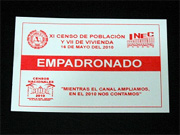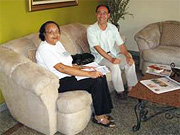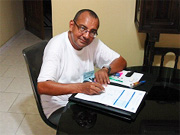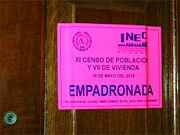Project News
2010-06-10
Tri-part Essay: “The National Census”
On May 16, 2010 (Sunday), Panama held its national census, which is held once every 10 years. For days, the media had been broadcasting the official notice: “On the census day, everyone must remain in their home until the census worker arrives.” JICA and the Japanese Embassy also sent us similar notices informing us that foreigners such as ourselves must also be counted.
“My Experience on the National Census Day” - by the 3 JICA experts
[Mr. Mizoguchi’s case]
 The census certificate reads, “registered in the census”, and has to be carried on that day.
The census certificate reads, “registered in the census”, and has to be carried on that day.
We had heard notices such as: “The census worker will come between 7:00am and 7:00pm,” “You may not leave your home or drink alcohol until the census worker arrives,” and “When you have finished the census you will be given a certificate which you must carry with you if you go outside that day.” Wondering what I would do if the census worker came at 7:00am, I couldn’t sleep well the night before and woke up at 5:00am.
During my morning walk I stopped at a nearby 24-hour supermarket to do some shopping. The store has more than 10 checkout lines, but only one was open and the line of people was so long it took 30 minutes before I reached the cash register. Just when I thought I could at last buy my tomato paste, pasta and juice, the register’s system went down. They said it would come back in 15 minutes, but even after 20 minutes it didn’t revive. I started to get heckled from the people behind, “What did that Chinese buy, anyway?!” (In Panama, there is a custom to call all Asians “Chinese”.) I began to worry what to do if the census started while I was stuck in the line, but the cashier was pretty and treated me very kindly so as I was engrossed in talking with her suddenly the system recovered.
“I wish I could have talked to her a little more...” I thought to myself as I returned to my hotel where I saw that it was already past 6:00 in the morning. At 7:10 the census worker arrived. I rolled up my sleeves and was ready to dig in, but the whole show was over in just 5 minutes. It was only a simple census made for foreigners residing in hotels. The receptionist lady told me, “That’s a record for the shortest census!” So we did a high five. I took a commemorative photo with the census worker and returned to my room.
I still had the whole day ahead of me, but what with doing laundry, cleaning my room, working on the computer and doing some reading I found that the whole day was spent and I hadn’t gone out of the room again. For all the expectations I had for the census day, in the end it was pretty much like any other Sunday. I should have at least gone out with the census certificate to see how many times I would be asked for it.
(Mr. Kotaro MIZOGUCHI, Coordinator)
[Mr. Mori’s case]
 Taking the census in the hotel lobby. The census bureau apparently sent English-speaking census-workers for foreigners in hotels.
Taking the census in the hotel lobby. The census bureau apparently sent English-speaking census-workers for foreigners in hotels.
I had a special interest in the national census, this time. The reason being that, eight years ago, in 2002, I had the experience of working as a census-taker while I was in Chile as a JICA volunteer. Both Chile and Panama use the same strong-arm method for taking their census: “on a given day, we’ll count every last person within our national borders by mobilizing a mass of census-takers.”
I had been assigned to a village office in the countryside at that time. After my coworkers and I received an introduction on using the census questionnaire, I set out on my bicycle to visit some 20 houses. As one advances in the questionnaire things that are normally hidden about a family in daily life are suddenly unveiled. However, no rumors spread throughout the villages because census-takers are sworn to confidentiality. In my case, every family was very curious to see a Japanese census-taker and offered me a drink or meal; in the home of elderly couples living by themselves I listened to their reminiscences of the past. I remember that the sun had long set before I finally returned to the village office.
Based on that experience I anticipated that the census would take about an hour, but like Mr. Mizoguchi, it was over in a flash – definitely a let down. I was only asked my name, nationality, date and place of birth, address, and civil status. The last question, which I remembered that I had also asked it in Chile was, “where was your mother when you were born?” I couldn’t help but grin when I answered, “in the hospital.” There must many Panamanians who answered likewise! The answer they are looking for, of course, is your mother’s address at the time of your birth.
(Mr. Taku MORI, Farmland use plan / Environmental Education)
[Mr. Sakai’s case]
 The census-worker who came to my apartment. He is carrying a census ID and wearing a uniform (T-shirt). The long sheet is the census questionnaire.
The census-worker who came to my apartment. He is carrying a census ID and wearing a uniform (T-shirt). The long sheet is the census questionnaire.
I decided that “since I can’t go outside today anyway, it will be a workday,” and I closed myself in my apartment with my computer. I soon received an e-mail from Mr. Mori, who lives in hotel: “I finished the census soon after 7:00am.” But in my apartment building there was no sign of a census-taker. Noon approached, but when I thought that the census-taker might arrive while I was cooking spaghetti, I lost interest in even cooking.
Our Project assistant, Mr. Ayarza (currently a college student), was supposedly working as a census-taker that day as a part-time job. He said he would get $40 for visiting 12 houses (12 families). “If it takes him 1 hour per house, that would be 12 hours total. Supposing there are 5 people per family that means he meets 60 people. Taking that as an average, since Panama’s population was about 3 million people in the last census of 2000, you would need 50,000 census-takers and their pay would be about 2 million dollars. The large container ships that pass through the Panama Canal pay around $200,000 in tolls, which means 10 large ships would cover the cost for the census-takers, hmm...” I must have been tired, because I found my thoughts drifting away from my work.
 The census certificate. It is a sticker to be placed on the front door.
The census certificate. It is a sticker to be placed on the front door.
Then, just before 5:00pm, I heard the long-awaited sound of the doorbell. “Come in, come in, please.” I welcomed the census-taker and immediately the questions began. First was the condition of the apartment:
“Is it owned or rented? How much is the rent? How many rooms, bedrooms? Do you have air conditioning? How many? How many ceiling fans? Do you have a refrigerator, a washing machine? How many computers do you have? Do you have Internet?” ...and so on. Later there were questions about basic infrastructure:
“Do you have drinking water?” (Well water or piped? Is it 24 hours?) “What type of toilet do you have?” (Flush type?) “Do you have electricity? What do you use for cooking?” (Gas or electricity?)
I made him a suggestion, “You’re doing the census for this whole building, right?” (He had just told me I was his seventh place.) “I’m sure the rooms are the same in all the apartments. Why don’t you just copy the answers from the previous person on the parts that are the same?” But he was a serious-minded fellow, “No, every family’s situation is different, so I can’t do that.” My proposal was rejected. Even so, I was sure that no one in the building used well water or cooked with firewood...
At the end, there were questions about individual information: name, nationality, date of birth, followed by occupation, income, educational degree, etc. One part that I found interesting was whether or not I had any handicaps. “Can you see? Can you hear?” (“I can’t hear Spanish very well.”) “Can you speak?” (“I have trouble speaking Spanish.”) “Can you move both arms?” (“Yes, I can move them,” and I showed him.) The parentheses are the jokes I gave with my answers, but he was straight-faced and didn’t respond to any of them.
Around 20 minutes passed with the questions and at the end he gave me two census certificates (one to stick on the door and the other to carry with you as a pass). The census was over.
(Mr. Isao SAKAI, Chief Advisor / Rural Development)
[Epilogue]
Quite a few people weren’t counted (the census-takers didn’t come) on the census day; therefore the census was repeated on Wednesday the 19th. Those people had to take a day off from work and wait in their homes again. The census program apparently had not been without errors, such as the logistics for the census-takers. According to the preliminary estimate, Panama’s population is 3.32 million.
